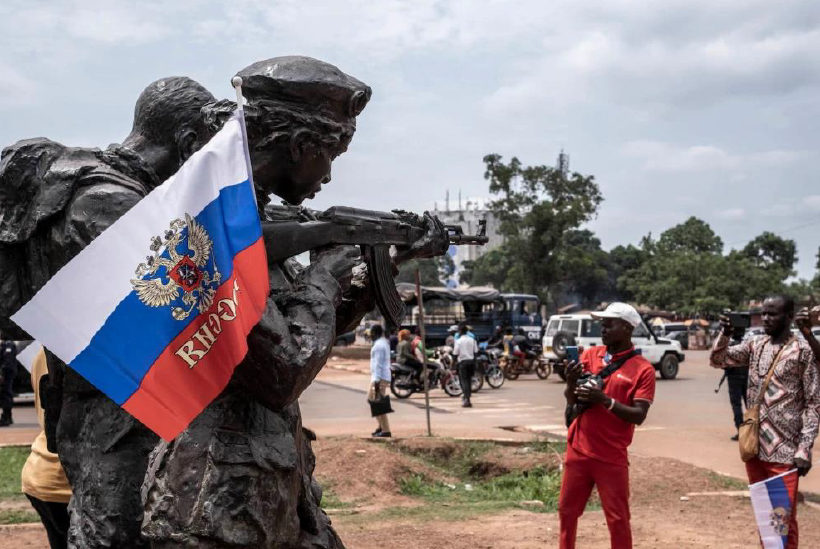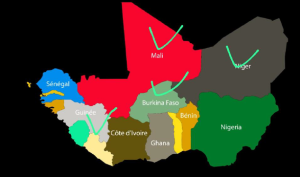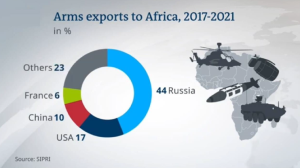After NATO and the EU, ECOWAS Would Be Next in the Kremlin’s Line of Sight

Russia’s plans for the European Union and NATO seem to have backfired, but It is on the verge of dismantling the strongest regional bloc in Africa, as we’re watching putsch after putsch unfold in West Africa.
Since Vladimir Putin has consolidated power in Russia, he has made no secrets about his ambitions of restoring the country to its “glorious past”. A past in which it ruled over the largest contiguous empire the world has ever seen. For most of the 1800s and 1900s, Russia focused its colonial expansionism on its direct neighbors in Eurasia -I say most because during my research to write this column, I came to discover that Russia did colonize Sagallo in the late 1800s, which would be in present day Djibouti however, they have recently made a sharp turn and decided to spread their tentacles to Africa.
Today, it is no longer a hypothetical, as Russia has quietly but surely been rendering ECOWAS obsolete by aiding and abetting coups in 4 of its member-states. Russia, through its mercenary groups, mainly the Wagner personal military corporation, is now present in Guinea, Mali, Burkina-Faso, and Niger amongst a growing list of African nations.

A quick glance at a map would show you the political and military makeover the Sahel has gone through over the last decade, and how pressing the danger is for what has until now been Africa’s strongest regional alliance of countries. To this effect, we’ve recently witnessed tensions flare between newly self-appointed military leaders in ECOWAS and the rest of the alliance’s establishment.
“It’s either Russia or we’d be living under our French colonial master.” This is the false choice that the pro Kremlin observers would want you to believe Africans must make. What they fail to mention is Russia has never been a democracy, and as I’ve previously written, it is the only country in the world still leading colonial wars. It has enjoyed relative success after invading Crimea and deploying their mercenary forces in Eastern Africa at the beginning of the 2010s.
Escaping Colonialism to Jump Into Feudalism: How Some African Countries Are Perfecting the Art of Cutting Off Your Nose to Spite Your Face
At the turn of the new decade however, those efforts begun to slow down after the Russian Federation was declared a state-sponsor of terrorism by the Parliamentary Assembly of the Council of Europe (PACE) on the 23rd of November 2022. In response, the Kremlin has withdrawn from the European Network of National Human Rights Institutions and is no longer part of the Conference of European Constitutional Courts (CECC). What ended up happening is quite remarkable because NATO, the alliance Mr. Putin sought to destroy, stands now stronger as a result with the newly additions of Sweden and Finland.
This political isolation was coupled with financial sanctions from Europe and its Western Allies that had devastating consequences on the Russian economy and its ability to not just finance the war in Ukraine, but to sustain itself altogether. Oil, the main asset of the Russian economy, was suddenly no longer desirable in the richest markets in the world. Putin was left with no choice but to turn towards China and India, two reluctant partners, who took advantage of the situation by buying Russian energy at an extremely low price and offering next to nothing in return in terms of help for the Ukraine war or diplomatic guarantees. In fact, both Narendra Modi and Xi Xin Ping have expressed in no uncertain terms their desire to see the war in Ukraine ended.
With resistance from the West and a very fragile relationship with the East, the Kremlin turned its eye towards Africa in hopes of replenishing their coffers by exploiting the continent’s natural resources through deals with illegitimate governments in need of their military help. And just in case you were wondering what Russia’s economic partnership in Africa was like, then you might be surprised to learn that despite all the talk of being a better partner to Africa than the West is, Russia only accounts for 1 whopping percent of the total foreign direct investment into Africa. Furthermore, the country exports 5 times more than it imports from Africa, to the tune of a US$12 billion current imbalance in favor of Russia. 2 Four years ago at a Russia-Africa summit, Vladimir Putin promised this figure would be doubled in favor of the African nations in 5 years, but at this point, he’s got a better chance of growing 6 foot tall.
If Russia isn’t bringing democracy or economic development to Africa, then what exactly is it bringing? Well, instruments of death would be a good first guess. According to the Stockholm International Peace Research Institute (SIPRI), Russia accounted for 44 percent of the arms imports in Africa between 2017 and 2021, with most of those weapons being destined to areas under conflicts.

It is clear that a strong ECOWAS is a menace to Russian control in Africa, and in order to establish its network of Influence on the continent, Putin would have to take on its strongest political bloc just he has attempted to do with the European Union. Through the Wagner mercenary group, the Kremlin has already undertaken this endeavor militarily by backing coup-d’états in several of the alliance’s 15 nations, and by threatening to encroach even more. Russia is also waging its campaign through mediatic propaganda, with its most effective tool being so-called “pan-Africanists” who’ve been paid handsomely to disseminate Russian propaganda3 and speak against western powers, most notably France.
Regardless of how you feel towards former colonizing countries, I think most would agree that inviting a new colonizing force is certainly not the answer in 2023. It is incumbent on West African leaders to take a proactive stance, starting with Niger, whose democratically elected president was just relieved of power by members of his former guard. This would-be coup seems, to no one’s surprise, welcome by the Kremlin as we’re already seeing Russian flags being brandished in Niamey.
When Putin went into Crimea, European leaders sat and watched it happen. When his mercenaries helped perpetrate war crimes in Syria, the US administration of the time huffed and puffed, but essentially did nothing of consequence. When they did the same thing in Darfur, the Word sat idly by. This time, I’m calling on West African leaders to not sit on the sidelines and wonder what would happen if they don’t act now.
We simply cannot afford to find out the answer to that question!
By Dema SANE


